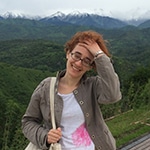In the decades since Ukraine gained independence, music has played a vital role in shaping and expressing a modern sense of national identity. This has been especially visible in the creative ways artists have drawn from the country’s folk traditions—adapting village songs, instruments, and motifs into new genres that resonate with contemporary audiences. Whether through rock, electronic, jazz, or even theatrical or entirely experimental forms, Ukrainian musicians have found ways to reinterpret folk culture in modern ways. Musicians in Ukraine today are asserting a vibrant, localized musical language.
These modern expressions of folk influence are not simply aesthetic choices; they are acts of cultural reclamation. During the Soviet era, Ukrainian folk music was often preserved in official forms that stripped it of political agency and regional diversity. Today, musicians across Ukraine are re-appropriating these traditions, imbuing them with humor, resistance, experimentation, and new meaning. Their work reflects the country’s linguistic and cultural richness, often embracing dialects, hybrid languages like Surzhyk, and themes drawn from folklore, mixed with those drawn from everyday Ukrainian life. In doing so, they make a powerful statement about who Ukrainians are and how they choose to be seen.
This article explores several major figures and groups who exemplify these trends. From the irreverent genre-mixing of Braty Hadyukiny to the haunting theatricality of DakhaBrakha and the ultra-modern electronic-folk fusion of ONUKA, these artists show how folk heritage can be reimagined in strikingly original ways. What unites them is not a single style but a shared commitment to localizing music—turning inherited forms into living expressions of a national culture that continues to evolve.
Braty Hadyukini
(Брати Гадюкiни)
By Michael Filitis
Braty Hadyukini (Брати Гадюкiни) is one of the most beloved Ukrainian bands from the close of the Soviet era. Their music combines a massive number of influences: rock, punk, funk, reggae, and blues. At the same time, what they are truly celebrated for is localizing their music to their native Ukraine. Their songs discuss folk traditions, fold in themes and melodies from folk songs, and are often set decidedly in Ukrainian locations.
They were also groundbreaking in their use of Ukrainian and Surzhyk, an informal amalgam of Ukrainian, Russian, and Polish (and, for Braty Hadyukini, English, Spanish, and other languages as well). Surzhyk skirts grammatical rules and mixes lexical elements. It has no official status and is still regarded as “low” language. However, it is not uncommonly used, and was especially popular for Ukrainian youth at the time. Hearing local themes and language was refreshing and empowering for many.
For all these reasons, Braty Hadyukini, and especially its iconic frontman Sergiy Kuzminskiy, is often cited as an important early cultural force that drove decolonization in Ukraine.
The band’s first major performance occurred at the Syrok–89 (Сырок–89) festival in Moscow in 1989. The same year would see the release of the group’s first album, Everything is Clear (Всьо Чотко), and a second-place finish at the Red Route (Червона рута) Festival in Chernivtsi in Ukraine. Their first album remained their most popular, with many of thier seminal hits such as “Drug Addicts in the Garden” (“Наркомани на городі“), which blends jazz with folk themes into an urban protest song. Also on the album were “Consider It Urban” (“Міську вважай“) and “My Little Star” (“Звьоздочка моя“), also well-known classics.
Over the next seven years, they released three more full-length records and toured extensively throughout Ukraine, Russia, Belgium, and Canada. Most of the albums released were successful, but It Was Not Loved (Було не любити; album cover features nudity) was best recieved, containing one of the band’s most singularly popular hits, “The Nice City of Ternopil” (“Файне мiсто Тернопiль“), a rock-blues song about drug use, love, musical preferences, and the need to go the wonderful city of Ternopil, population 225,000, in Western Ukraine.
The consistent touring, however, appears to have taken a toll on the group, with several members pursuing other projects or careers. In 1994 Kuzminskiy also checked himself into a drug addiction treatment center in Belgium. Their fourth album, Щасливої дороги!, released in 1996, fell somewhat flat, in part because Kuzminskiy began to experiment heavily with electronic backbeats that were less well received than the more collaborative big-band sound they had formally been known for.
The band suspended their activity in 1996. Longtime band members Igor Melnichuk and Pavel Krakhmalev opened their own studio and had great success recording music and themes for television and radio in Ukraine and Russia. Frontman Kuzminskiy became a radio DJ, promoter, and electronic musician.
The group reunited in 2006 for a concert at the Olympic Stadium in Kiev, filling it to capacity with 15,000 excited fans. This was perhaps done as a last hurrah, as Kuzminskiy likely knew that he was ill by this time. In 2009, he succumbed to throat cancer. Braty Hadyukini has given several concerts since that time in his honor, often joined by many big names in Ukrainian music. The group also recorded a fifth studio album, (self titled), in 2014, and dedicated it to him.
The Veryovka Ukrainian Folk Choir
(Національний заслужений академічний український народний хор України імені Г. Г. Верьовки)
By Julie Hersh
The full name of Ukraine’s premier folk choir translates to “The National Distinguished Academic Ukrainian Folk Choir of Ukraine Named for G. Veryovka.” It was founded in 1943 by the USSR’s Council of People’s Commissars in Kharkiv to promote and spread Ukrainian folk music and dance traditions. The group’s first official concert, in September 1944 in Kyiv, brought about 300 listeners. The group was closely connected with both promoting morale during WWII and with official Communist leadership.
After its original director, Hryhoriy Veryovka died in 1964, the choir took on his name. In 1971 the chorus was given the “academic” honorific, and the “national” was added in 1997.
The group has always been academically focused as well, fusing high culture and education with folk culture. Since 1962, the chorus has had an educational studio for training artists attached to it. Among the choir’s 150 members are also ballet dancers and operatic singers, whose crafts are also on display, often together with folk music and costume, during performances.
The choir’s repertoire includes more than 1,000 songs, including classic folk songs from all the regions of Ukraine, modern folk music written by contemporary composers, and folk songs from outside Ukraine. In 2011, they gave the premier performance of Yevhen Stankovych’s opera The Fern Blossom (Цвіт папороті). Originally written in the 1970s, it was denied production by Soviet censors. It has since become a popular piece in Ukraine, performed by many other folk institutions like The Theater of Choreographic Miniatures.
Today, the chorus remains state funded and is the largest chorus in Ukraine. It supports orchestral, choral, and dance groups, giving regular performances at its own dedicated theater complex in downtown Ukraine. They often perform at state functions and are sent on diplomatic good will performances around the world.
ONUKA
Michael Fillitis
ONUKA is a Ukrainian electro-pop group from Kyiv noted for their use of traditional Ukrainian folk instruments—predominantly the bandura (a stringed instrument) and the sopilka (a wind instrument)—in their arrangements. The name is a nod to the grandfather of vocalist and songwriter Natalia, or Nata, Zhyzhchenko grandfather, the renowned master folk instrument maker Alexandr Shlonchyk. The nod emphasizes her heritage, but also points to the fact that the music has evolved by three generations. ONUKA has taken folk themes and placed them solidly within the framework of modern art.
Zhyzhchenko formed the band in 2013 with multi-instrumentalist and producer Yevgeny Filatov (Євген Філатов). They sing in Ukrainian and English. Their first concert followed that summer at Club Sentrum in Kyiv, opening for Filatov’s other group, The Manaken. Their first full-length record, the self-titled ONUKA, released in 2014, was iTunes Ukraine’s top selling album that month. That album’s biggest hit, TIME, remains one of their most popular songs.
In early 2016, the group released an EP, Viklik. Inspired by the approaching 30th anniversary of the nuclear accident at Chernobyl, the album contains sound recordings of emergency personnel from the day of the disaster. On the date of the actual anniversary, April 26, the band organized a concert to perform the EP and commemorate the event. Music from the record was also later selected for a documentary film produced by the Ukrainian television channel 1+1 regarding the accident and its fallout.
In 2015 they were awarded the privilege to perform at the Sziget Festival in Budapest, one of the largest international music and art festivals in Europe. Meanwhile, In 2017, they appeared as a guest artist at the final of the Eurovision Song Contest 2017 with The National Academic Orchestra of Folk Instruments of Ukraine (NAONI) took part in the performance.
In 2021, ONUKA released their third studio album, COLOR (KOLIR), which offers what has been its biggest Ukrainian-language hit to date, “ZENITH” (“ZENIT“) and the lilting IMAGINE (UYAVY), produced together with Dakhabrakha, another famed modern folk group also featured on this page.
In 2024, ONUKA helped produce a documentary on Ukrainian folk instruments to help advance knowledge of Ukrainian folk culture. The video is available for free on YouTube in Ukrainian with English subtitles.
DakhaBrakha
(ДахаБраха)
By Julie Hersh
DakhaBrakha (ДахаБраха) is a contemporary Ukrainian folk- and world-music quartet. They actually call themselves an “ethno-chaos group.” Its current members are Marko Halanevych (Марко Галаневич), Iryna Kovalenko (Ірина Коваленко), Olena Tsibulska (Олена Цибульська), and Nina Garenetska (Ніна Гаренецька). All sing and play a variety of traditional folk instruments. Unlike many other Ukrainian bands, they are very much Ukrainian language–oriented—even their website doesn’t have a Russian option. The name can be translated from Old Ukrainian as “give/take.” “Dakh” also means “roof” in Ukrainian.
DakhaBrakha’s origins are as unique as its sound. It was formed in 2004 at DAKh (ДАХ), the Kyiv Center of Contemporary Art, by director Vladyslav Troitskyi (Владислав Троїцький). They are still affiliated with the center. From the start of the band’s existence they have participated in folk music festivals—including Bonnaroo in 2014, where they were named the “Best Breakout” of the festival by Rolling Stone. They’ve won some prestigious prizes, most notably the Sergey Kuryokhin Prize (Премия Сергея Курёхина) for contemporary art. They have six studio albums to their name, the first, Yahudky, from 2007 and the most recent, Alambari, released in 2020.
The band’s sound starts as generally with a base of Ukrainian folk. Instrumentation, vocalization, and/or melodic arrangements might form this base. However, nearly all their songs are individual, with influences from folk sounds from all around the world, including from India, Africa, the Arab world, Australia, and Russia, with jazz, blues, and rock influences often through in for good measure as well.
Compare, for example, the achingly dark “Good Night” (“На добраніч“) with the hectic whimsy of Up To 100 Years (До ста літ). Likewise, compare the rich rap-infused jazz of Monakh with the emotionally and physically driving Vesna.
Their theatrical origins are also embedded in their style—their concerts are always theatrical and rich. You are also likely to hear their songs completely anew. Compare, for instance, the version of Vesna above with this one, now rich in realistic animal sounds made by the performers. They have also put their theatrical skills to work in soundtracks and even lending their music and likenesses to a folklore-themed Ukrainian movie, Mavka. The Forest Song, in 2023. There, they wrote and performed part of the soundtrack and played the musicians and a group of forest creatures, even lending thier likeness to the characters. See, for instance, this clip.
They also have some extramusical goals: their website notes that they aim to “open up the potential of Ukrainian melodies and to bring it to the hearts and consciousness of the younger generation in Ukraine.” They have something of a radical spirit as well, hoping to inspire “artistic liberation.”
Dakh Daughters
By Morgan Henson
A self-described “freak cabaret,” the Dakh Daughters is a Ukrainian music and theater group comprised of seven women who use dramatic make-up, old clothing, and innovative melodies to draw their audiences in. Their name derives from the Dakh Theater, which is closely tied to the group and often hosts concerts for them.
The band formed after the bands Perkalaba (a Ukrainian gypsy-ska-punk band) and DakhaBrakha (another Ukrainian experimental folk group started by the Dakh Theater), played a one-time collaborative performance in 2012 in Paris. However, the dynamic of the group was so original and well-received that they decided to remain together.
The band members play a wide variety of instruments and speak-sing in different languages and dialects to add irony and emotion to their music. Each song they perform is a mini-cabaret of “sung-spoken monologues, eerie Ukrainian folk harmonies, percussion, strings, stringed instruments turned into percussion, wailing, weeping, white face paint, moaning and gnashing of teeth.” They often use works of famous poets such as William Shakespeare, Taras Shevchenko, Joseph Brodsky, and many others in their lyrics as an inventive play on words to create an ominous, spine-tingling sound.
The band initially rose to fame in 2013 after publishing a video for the song “Rozy/Donbass” which mixed Shakespeare’s Sonnet 35 and traditional Ukrainian folk songs. This video alone captures the overall feeling from watching this group; you begin with an uncomfortable entrance and then the instruments begin as an interruption of the calm you have been lulled into. As the song progresses, the women play off of one another and their voices begin to soar above the original melody. At the end, the listener is left with the same uncomfortable feeling they began with, but with an ironic sense of peace. The strength and command of the women’s voices is intriguing and makes the listener crave more.
The music is, like DakhaBrakha, a base of Ukrainian folk in melodies or vocal styles, but then has jazz, rock, reggae, rap, punk, and other influences layered over it with theatrical flourishes.
They have performed throughout Ukraine at numerous festivals, as well as in Poland, France, Russia, and Brazil. They have also released four studio albums to date, starting with IF in 2016 and most recently Pandora’s Box in 2025. The latter is heavily focused on the current war in Ukraine. It alternates between rage and sorrow as it contemplates the surreality of living a life that still involves the day-to-day even as one knows the violence being felt elsewhere in the same country.
Rosava
(Росава)
By Julie Hersh
Rosava (Росава; real name Olena Yanchuk, Олена Янчук) was a contemporary Ukrainian folk, electronica, and pop singer. She grew up near Kyiv in a musical family. Her father played the trumpet and directed a brass band, and her mother was an amateur folk singer. She went to music school as a child and took private music lessons. She won multiple festivals and contests. After attending university in Canada where she international relations as well as vocal jazz, she won both the pop music award and the audience choice award at the Red Ruta (Червона Рута) festival. This festival is known for helping create pop stars in Ukraine. Around this time, she adopted the name Rosava.
She released her first full album, Simply Heaven (Просто неба) in 2001, with the participation of many musicians from Tanok na Maidany Kongo (Танок на майдані Конґо), a popular band her producer once performed with. The album is mostly pop and dance, but also mixes considerable amounts of folk stylings and samplings to the mix, including opening with a folk singing sample in the opening title song.
Although she performed and worked on new songs, she apparently felt pulled toward more traditional folk. Her second album, Lullabies (Колисанки), was released in 2006, a collection of traditional children’s lullabies. Many of these have actually been her most lasting popular songs, particularly her rendition of Little Grey Cat (Котику сіренький). She returned to pop after this, but eventually released her las album, Joy (Радість), in 2013, which again focused on traditional songs, mostly for children.
After releasing what may have been her biggest radio hit, the girl-power dance song “A Girl Like Me” (“Дівчина така я”), which features some folk influence, she largely retired from music. According to her Instagram page, she now focuses on her family and working as a music therapist.
Go_A
Go_A began in 2012 when music producer Taras Shevchenko met singer Kateryna Pavlenko. Shevchenko supplies the electro with his keyboard and soundboard while Pavlenko adds folk vocals, which are always only in Ukrainian. These two are supported by Ivan Hryhoriak on guitar and Ihor Didenchuk on the soplika, a traditional wind instrument.
The band’s name, Go_A, has a cryptic meaning. The “go” literally means “go” but the “A” is representative of the Greek letter Alpha which is the beginning, or root letter, of the alphabet. So, the group’s name is actually a command to go back to your beginnings, to your cultural roots. This is the goal of the group, to bring folk music and culture to a wide, contemporary audience by blending it with modern music.
Although nearly all their hits have been arrangements of folk songs, most of the band’s music are actually originals written by lead vocalist Kateryna Pavlenko. Pavlenko is a master of what is known as “white voice,” a vocal style traditional in most Slavic countries. Anyone who has heard it before can usually immediately recognize its powerful notes and sudden movements in pitch. White voice also focuses on the pharynx or back of the throat while most singing in western countries is performed in the mouth.
Go_A first gained notability in 2016 when their breakout hit, “The Mayfly” (“Веснянка“), a folk-metal-dance restyling of a old Slavic folk song topped the dance music charts in Ukraine for six straight weeks.
They went on to win the televised Ukrainian song contest, Vidbir, which selects (as the name implies) who will represent Ukraine at Eurovision, an annual Europe-wide pop-music contest. The group’s winning entry “The Nightingale“ (“Соловей“) is a well-known traditional song, features singers that imitate animal songs, a common feature of Turkic and some Slavic folk singing. Unfortunately, the Coronavirus pandemic canceled Eurovision that year. Go_A was allowed to keep their place as Ukraine’s representative, but had to submit a new entry song according to the Eurovision rules. To do so, they made a new arrangement of “NOISE” (“ШУМ“), yet another traditional Slavic song, which has to date been their biggest hit. The song finished fifth in the Eurovision contest.
To date, Go_A has released only one album, Ідиназвук, which loosely translates to “And The Sound.” Most of their music has been released as singles, such as their most recent “Dill” (“Kріп“), an ode to gardening and the singer’s love of a Cossack boy. Readers might also check out “I Thought” (“Думала“), which has an English translation embedded in its animated video.
Ruslana
(Руслана)
By Julie Hersh
Ruslana is a wildly popular Ukrainian singer. She is typically known by her first name only. Her full name is Ruslana Stepanivna Lizhichko.
She is known for songs that explore her Hutsul heritage—a tribe from the Ukrainian Carpathians. Her breakout hit came in 2003 with “Wild Dances” (“Дикі танці“), which won first place in the Eurovision song contest of 2004, held the title of best selling Ukrainian album ever for nearly a decade afterwards, and was named a “Legend of Ukrainian Music” in the Song of the Year awards ceremony in 2021. Ruslana was also named a People’s Artist of Ukraine.
A graduate of the Lviv Conservatory, she studied conducting and classical piano. In 1993, she won both the acclaimed Chervona Ruta and Taras Bulba contemporary music festivals. The year after graduating, she started her career as a solo singer. Her 1998 debut album, A Moment of Spring – Wind Bells, a pop album that utilizes folk instrumentation and themes, was critically acclaimed but did not become very popular. In 2000, she began what she called “The Hutsul Project,” looking specifically at her own heritage. The songs created from this eventually resulted in album Wild Dances (“Дикі танці“). With this, Ruslana also transformed her image from a 90s pop love interest, with soft sweaters and denim shirts, to a full-on warrior princess with leather, studs, and weaponry.
Over the next ten years she released four more Ukrainian-language albums and another four in English. Her 2008 “Wild Energy” (with most songs released in Ukrainian as well on THE AMAZON (АМАЗОНКА)) includes classical piano and duets with T-Pain and Missy Elliott.
She is also just as known for her social and political activities. From 2004 to 2005 she was a UNICEF Good Will Ambassador to Ukraine. She has campaigned against human trafficking and raised money for victims of the Chernobyl disaster. During the 2004 Orange Revolution, she supported the political opposition and addressed crowds during the protests; from 2006 to 2007 she served in the Verkhovna Rada (Ukrainian parliament) in the Our Ukraine Party. She has led campaigns to restore historical castles in Ukraine, promote renewable energy, and stop strip logging in the Carpathians. She was also a dedicated supporter of the Euromaidan movement, giving speeches and singing to crowds on Maidan Nezalezhnosti Square. Since then, she has continued her political activism, meeting with international government officials to ask for support for Ukraine, including through the War in Ukraine.
Ruslana recently turned 50. To celebrate, she has released a spate of new music, likely in preparation for a new album. This has included the song “Grand” (“Буйна“). The video for this song shows that she still has 100% of her energy and style intact.
You’ll Also Love

From Folk to Future: Localizing Sound in Modern Ukraine
In the decades since Ukraine gained independence, music has played a vital role in shaping and expressing a modern sense of national identity. This has been especially visible in the creative ways artists have drawn from the country’s folk traditions—adapting village songs, instruments, and motifs into new genres that resonate with contemporary audiences. Whether through […]
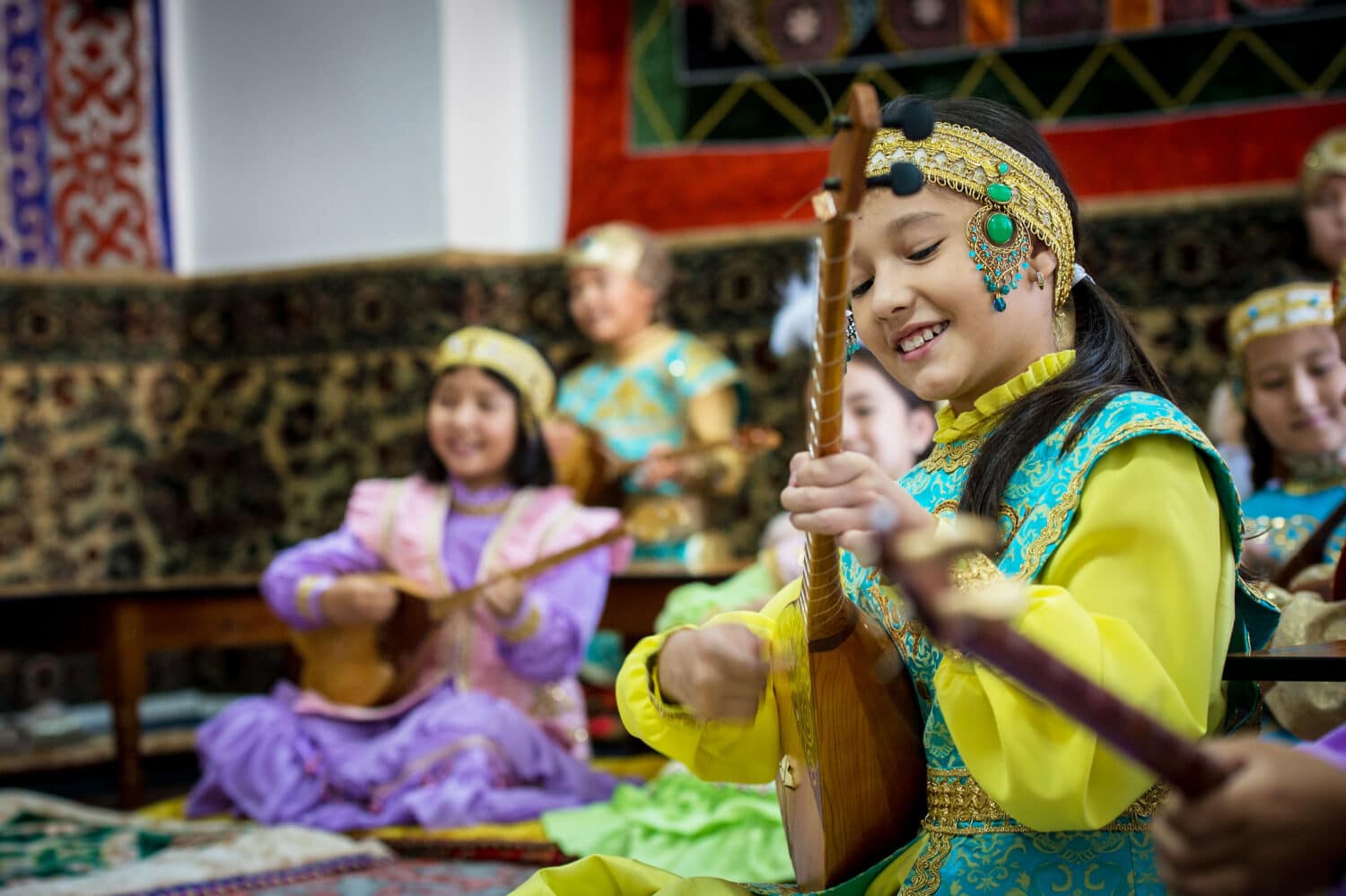
The Dombyra: The Kazakh’s Musical Soul
The dombyra (домбыра) is a lute-style instrument. It is an ancient and quintessential piece of Kazakh culture and identity. In its most popular form, the dombyra has two-strings strung down a long, skinny neck and a pear-shaped body, flat at the front and rounded on the backside. The standard English spelling of dombra is taken […]
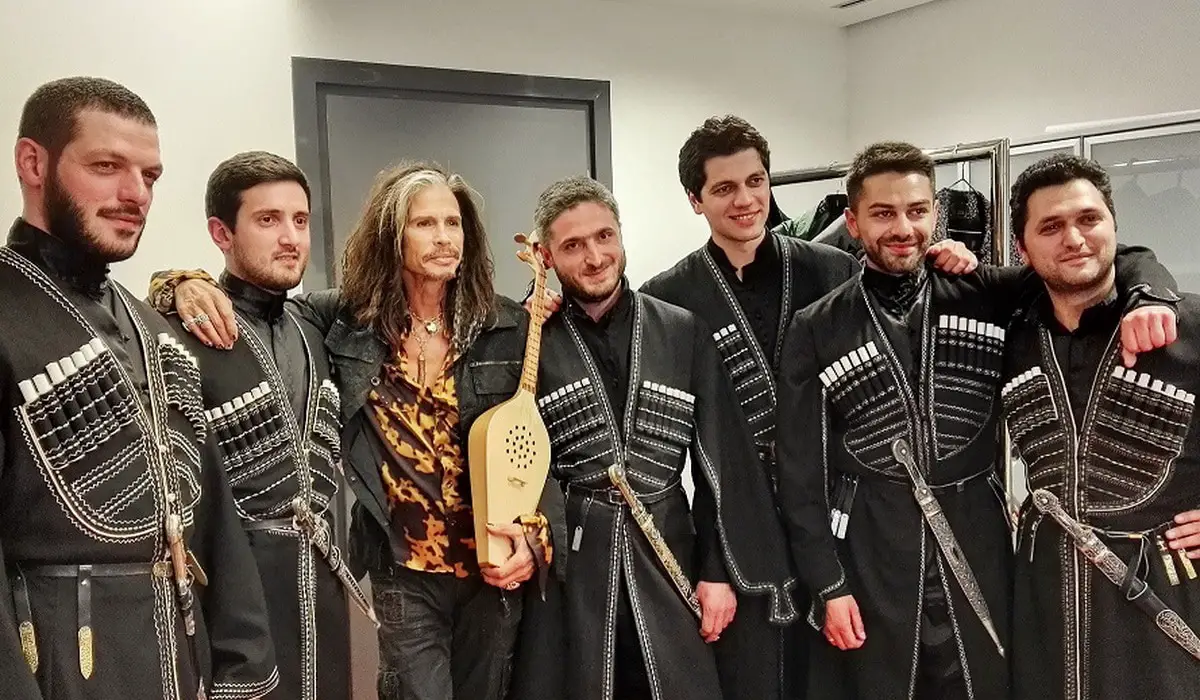
Six Georgian Bands Bringing Traditional Polyphony into the Pop Music Age
Georgian polyphonic singing, added to the UNESCO Representative List of the Intangible Cultural Heritage of Humanity, is a musical technique in which a single song has several melodies, each sung concurrently, with no one tune dominating the others. In Georgia, the style varies by region, but the practice reflects both military, folk, and religious culture. […]
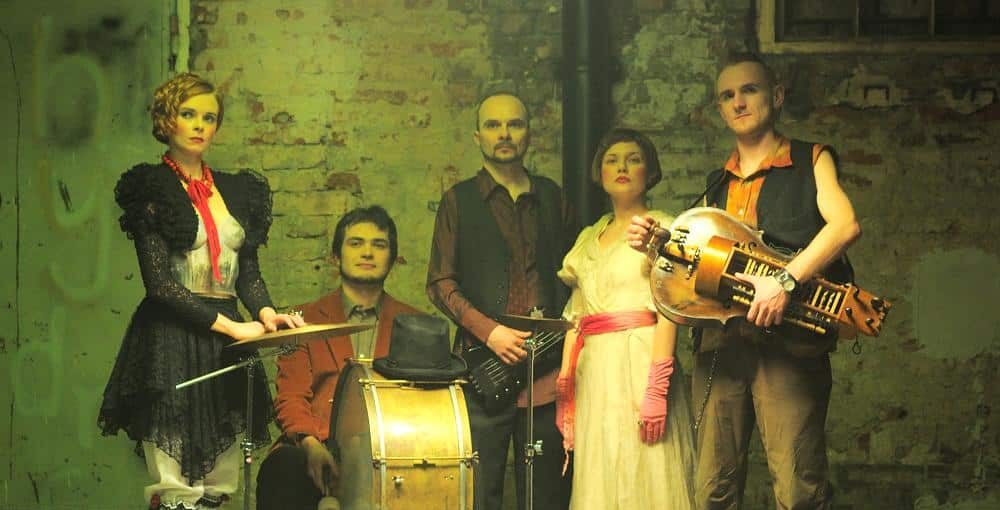
Żywiołak: Pagan Rock from Poland with a Modern Mindset
Żywiołak, initially formed in Warsaw in 2005, is a Polish folk rock band steeped in mythos. Its name references the Elemental, a magical being said to harness the power of nature in the form of air, fire, water, or earth. Their lyrics sing of epic battles (in Wojownik, or Warrior) and explore the traditions of […]
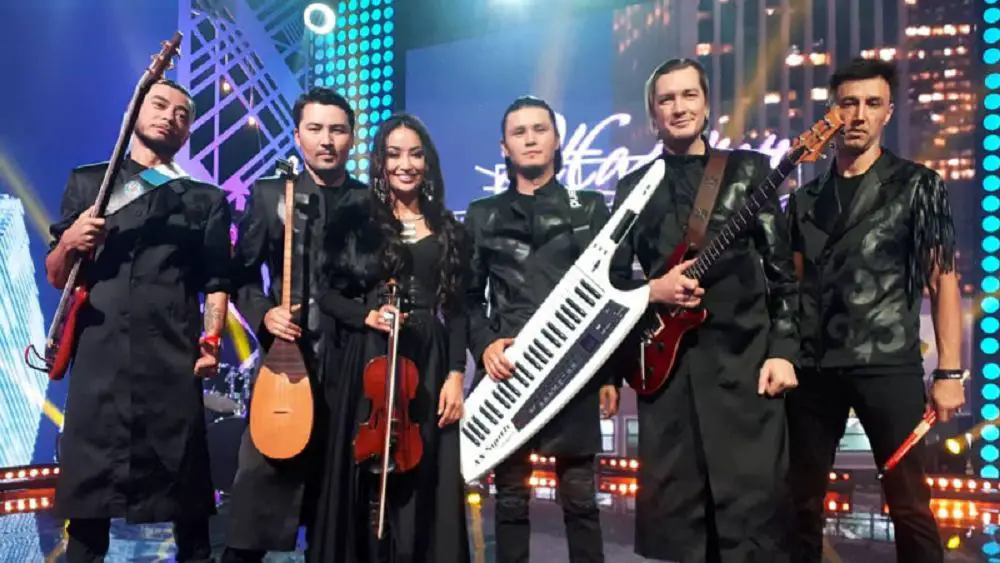
5 Bands Bringing Traditional Kazakh Style to Modern Rock
Here are five Kazakh bands working to bring traditional Kazakh instrumentation and musical styles into modern music. Roksonaki Seamless Kazakh Folk Rock Roksonaki is a Kazakh band that was formed in 2006. Its name means “lightning” in Kazakh, chosen to represent the band’s energetic and electrifying musical style. They are known for their unique fusion […]



